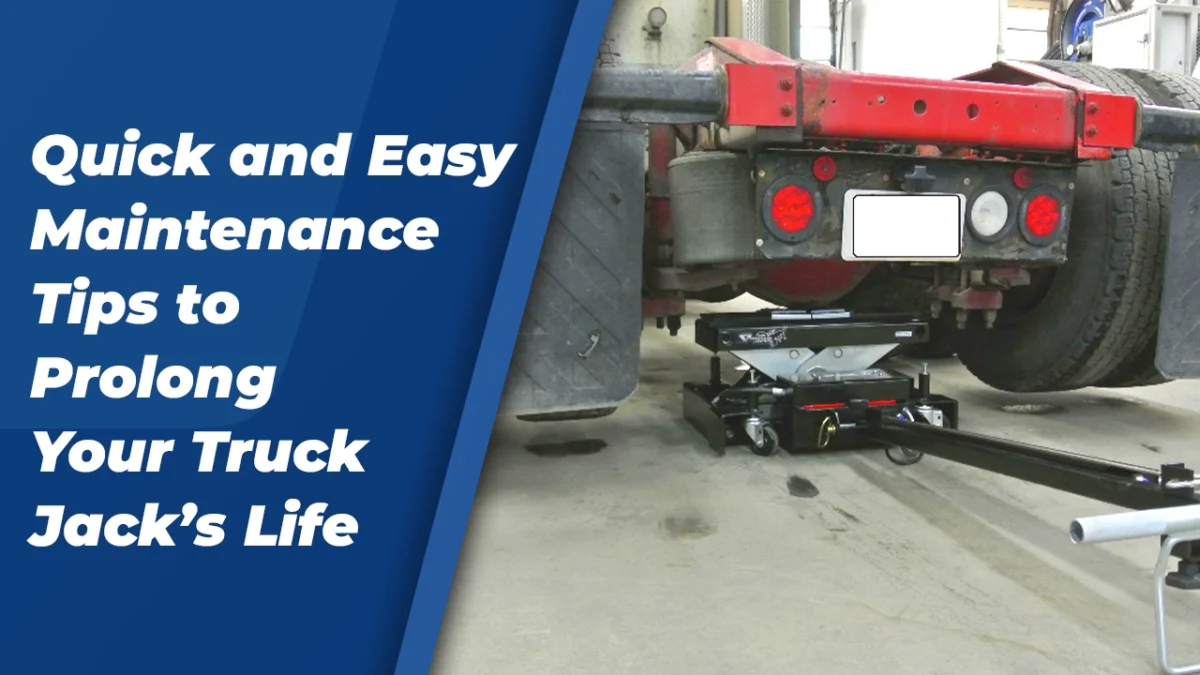A truck jack is a mechanical device that is used to lift heavy-duty armored trucks and military-grade vehicles, among other types of trucks and heavy vehicles. Heavy duty truck jacks are specially designed to bear these loads that ordinary automotive jacks traditionally cannot.
Apart from providing superior lifting solutions and Designed for heavy-duty lifting of vehicles, including trucks and armored cars. These Jacks also provide additional services like tire and oil changes. The diversity and quality of truck jack benefits you will derive from your equipment depends primarily on two factors. One, its mechanism of operation, meaning whether it is built for singular or multi-purpose use.
Two, whether it is stored and maintained properly with regular checks being implemented. This step is critical for the long-term wellbeing of your heavy-duty truck jack and making it more reliable and durable for you despite on-the-job wear and tear. Miss this crucial step and you have an empty tin can on your hands needing frequent replacement.
That is why we will cover 8 quick and easy maintenance tips to prolong your heavy-duty truck jack’s life in this blog. By following these steps, you can turn your recurrent purchases (of buying new heavy-duty truck jacks and replacing them at regular intervals) into a long-term investment in truck lifting solutions.
Features that Guarantee Prolonged heavy duty Jack Life
Before we get into the 8 quick and easy maintenance tips to prolong your heavy-duty truck jack’s life, we would like to ensure that you know that these alone are by no means foolproof measures against a jack’s long term on the job wear and tear.
What kind of heavy duty truck jack you buy?
Meaning the truck jack benefits its features have to offer- matters just as much. So, we will quickly discuss the top features inherent to top performing heavy duty truck jacks that future proofs your investment.
- Load Capacity – The load capacities of heavy-duty truck jacks vary significantly from ordinary ones, owing to the types of vehicles they are designed to lift. So, naturally, it would follow that a heavy-duty truck jack would have a higher load capacity more commensurate to lifting bigger trucks than regular jacks. Using the right jack for the right vehicle is bound to prolong the life of the jack.
- Component Quality – Perhaps the most important feature of an ideal heavy-duty truck jack- whether it is a hydraulic or pneumatic- is the quality of its component parts that determine its prolonged performance. Stan Design Inc. is a leading heavy-duty truck jack manufacturer that uses high gloss powder coat paint and zinc plated components that enhance their functionality.
- Build Material – Finally, the material used to build the jack- usually steel- must be of high quality so it can ensure safe and prolonged use of the heavy-duty truck jack. This quality goes a long way in determining whether additional support accessories like chocks or stands would be required in the lifting process. Stan Design Inc. heavy-duty truck jacks are made with high-grade steel that resists corrosion and deterioration.
Heavy-duty Truck Jacks– 8 Maintenance Tips
Maintaining your heavy-duty truck jack is no rocket science. Everyone can do it with a little patience and our guide. So, without further ado, here are 8 quick and easy maintenance tips to prolong your heavy-duty truck jack’s life. Happy learning!
- Storing it in a clean and dry place– Heavy-duty truck jacks have various components that must not be exposed to humid or dirty environments. For instance, in hydraulic jacks that run on grease and fluids, stored within, any contact with dirt or external moisture is bound to contaminate it, rendering it useless or potentially harmful even.
- Creating a regular inspection checklist– Once the storage is looked after, stick to a robust checklist of items or procedures required to maintain your heavy-duty truck jack. You may begin with setting up a maintenance routine which will help you compartmentalize your time and organize your chores accordingly. Even though jacks rarely demand any attention, if kept properly, keep an eye out for unusual issues.
- Using quality lubricants– High-grade oil, grease, or hydraulic fluid, in the case of hydraulic jacks, must be used for the truck lifting solutions. This reduces unnecessary friction which can lead to premature wear and tear within the mechanical and structural components of jacks. Check and refill oil levels accordingly. With pneumatic jacks, check pressure test point locations, flow rates within the system, air motor speeds, etc.
- Checking for physical dents– The most visible giveaway sign of a potential malfunction is a physical dent on your jack body or, worse, broken parts. So, keeping a lookout for these on and off your jack, prevents the costs related to repairs from accruing. And of course, it also helps you to get it fixed before it hurts you or someone else.
- Cleaning and restoring after every use– Use a damp cloth to clean the dirt after a use, before it settles and gets sticky. Grease tends to attract a lot of dirt because of its texture, leading to rusting and clogging within jack
- Troubleshooting burst hoses or valves– Applicable exclusively to pneumatic heavy-duty truck jacks, troubleshooting burst hoses or valves prevents or identifies early excessive air leakage, inadequate pressure levels, loose manual operations, and erratic functioning components. Compressed air is an unstable element in pneumatic systems, so missing this step can cost heavily.
- Bleeding hydraulic cylinders– Applicable exclusively to hydraulic heavy-duty truck jacks, this step involves releasing pressure before putting the jack away. Bleed the cylinders regularly before storage. Otherwise, the jack would strain lifting and supporting loads. This also makes the tool more compact and easier to store. Finally, it releases stress on the system that can contribute to the deterioration of various components.


